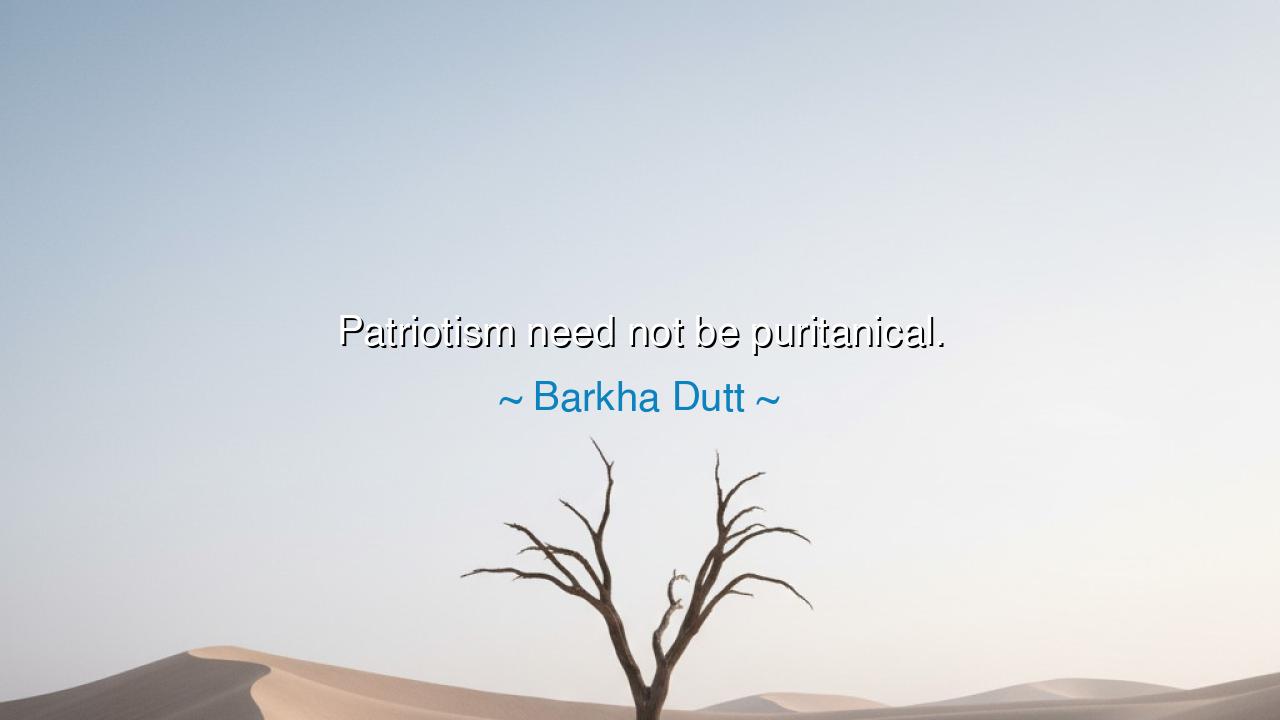
Patriotism need not be puritanical.






Hear, O seekers of truth and guardians of the land, the voice of Barkha Dutt, who declared: “Patriotism need not be puritanical.” In these words lies a profound lesson, born of reflection upon the nature of love for one’s country. Too often, patriotism is presented as rigid, harsh, and unforgiving—a stern idol before which all must bow in silence, with no room for questioning, no space for dissent. Yet Dutt, with the wisdom of one who has witnessed both triumph and turmoil, reminds us that true devotion to one’s nation is not chained to severity. It may be joyous, critical, inclusive, and alive with diversity.
The origin of this thought lies in the lived experience of societies where patriotism is often equated with blind obedience. To be patriotic, many are told, is to agree always, to never question authority, to see only glory and not acknowledge flaws. But Dutt’s words echo a higher wisdom: that patriotism is not weakened by criticism; it is strengthened by honesty. Love that cannot endure truth is not love at all, but idolatry. The patriot who dares to speak against injustice does not betray their country—they honor it more deeply than the silent admirer.
Consider the tale of Mahatma Gandhi. His patriotism was not puritanical. He did not demand blind loyalty to leaders or uncritical reverence for tradition. Instead, he held India itself to the highest standard, challenging caste oppression, injustice, and violence. His love of the land was expansive, not rigid, and it embraced truth even when uncomfortable. In this way, he proved that true patriotism can be both tender and fierce, both reverent and rebellious.
So too in the history of America, we find Martin Luther King, Jr., who declared that he dreamed of a nation that would live up to the words of its founding creed. His patriotism was not puritanical—it was prophetic. He loved his country enough to challenge its sins, to call it higher, to demand that it live its promise of liberty and justice. His life is a testament to Dutt’s words: that love of country does not mean silence before its flaws, but devotion to its potential.
The meaning of the saying is therefore clear. Patriotism that is puritanical is brittle, for it cannot bear criticism. It silences its own children, mistaking questioning for betrayal. But patriotism that is open, compassionate, and self-reflective is strong, for it grows through correction. It recognizes that nations, like men, are imperfect, and that true loyalty lies not in covering weaknesses, but in striving together to heal them.
The lesson for us is this: love your country with maturity, not with blindness. To honor the land of your birth or your adoption is not to insist it is flawless, but to nurture it toward justice, truth, and compassion. If leaders misuse patriotism as a weapon to stifle dissent, remember that the greatest patriots in history were those who questioned, who spoke, who dreamed of better. Patriotism need not be puritanical—it can be vibrant, joyful, diverse, and filled with the fire of reform.
Practical counsel stands before you. When you see wrong in your nation, do not remain silent out of fear of being called unpatriotic. Speak truth, for silence is the true betrayal. Celebrate your land with song and joy, but also with courage and honesty. Honor its achievements, but never ignore its wounds. Teach your children that love of country means working to make it kinder, fairer, and stronger. Let your patriotism be rooted in love, not in fear; in hope, not in rigidity.
So let Barkha Dutt’s words echo like a guiding flame: “Patriotism need not be puritanical.” Carry them as a shield against narrowness, and as a banner of freedom. For the truest love of country is not worship of its image, but service to its soul. And those who love their nation with both joy and courage leave behind a legacy that time itself cannot devour.






AAdministratorAdministrator
Welcome, honored guests. Please leave a comment, we will respond soon